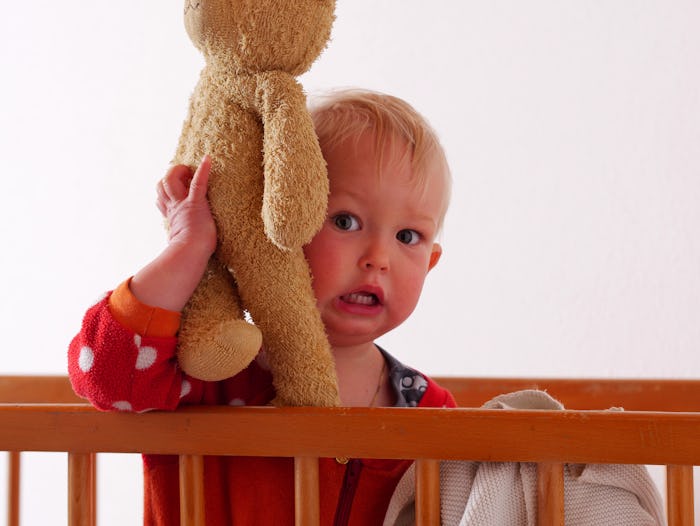Life

5 Signs Your Baby Is Having A Sleep Regression & Not A Growth Spurt
Sometimes the first year of parenthood can feel like one 12 month long sleep regression. Whether or not you’re blessed with a baby who magically sleeps through the night from the day they were born, or a “problem sleeper” who wakes every two hours for months at a time, every baby goes through sleep regressions. However, these sleep regressions are commonly confused with growth spurts or just passed off as a “phase,” when they’re really just a normal part of your baby’s development. There are a few signs your baby is having a sleep regression and not a growth spurt, although it’s easy to confuse the two. Although there isn’t really much you can do about sleep regressions, knowing when to expect them will ensure that you’re as prepared as possible when the time does come.
According to the Family Sleep Institute, a sleep regression is “a cognitive, physical and/or emotional development that disrupts a child’s normal sleep pattern.” As vague as the definition sounds, know that though they’re never fun, sleep regressions are actually signs that your child’s cognitive and physical development is right on track. So instead of lamenting over their (and your) inevitable loss of sleep, tell yourself “this too shall pass” on repeat and take heart knowing that your baby is growing right on track.
1They’re More Than Four Months Old
According to an article by a pediatric sleep consultant on Huffington Post, the first (and generally most dreaded) sleep regression usually occurs around four months. Although each baby is different and will experience regressions to varying degrees, you can expect to see a change in their sleep pattern around this time.
The reason behind the four month sleep regression is simple: you baby is transition out of the newborn phase and into a more “adult," scheduled sleep schedule. According to the article cited above, this is the time when parents should begin to consider starting nap time and bedtime routines to help guide their baby’s natural circadian rhythm.
2They’re Waking More Frequently At Night
The most obvious sign of a sleep regression is that your baby will begin waking more often than they have been. Even if your baby is over four months old, there are several other “normal” regressions your baby will probably experience. According to the Baby Sleep Site, the three common sleep regressions occur at four months, eight months, and 12 months, so if your baby is around these ages you can expect more frequent wakings at night.
3They Don’t Sleep Through Things As Easily
The Family Sleep Institute stated that as your baby exits the newborn phase, they lose their ability to sleep through virtually anything. The days of bringing your baby to loud events, grocery stores, or even in the room with other children and knowing they’ll sleep through it are probably coming to a close.
4They Aren’t Hungry Or Sick
Naturally, ruling out hunger and sickness is one of the first steps to determining if your baby is indeed going through a regression. When babies are young, they’ll likely wake more often during the night to eat, according to Dr. Sears. Similarly, when a child is sick, waking up from discomfort or pain is to be expected. If these two causes aren’t a factor, you can likely assume it’s a sleep regression.
5They Aren’t Having A Growth Spurt
Although sleep regressions are certainly triggered by normal growth patterns your baby will experience, they aren’t the same thing as a growth spurt. According to the Baby Sleep Site, normal growth spurts happen much more frequently than sleep regressions, and can influence their sleep habits as well. Sleep regressions have less to do with weight gain and physical growth (which usually causes babies to be more sleepy, instead of sleeping less), than they do with cognitive and mental growth.